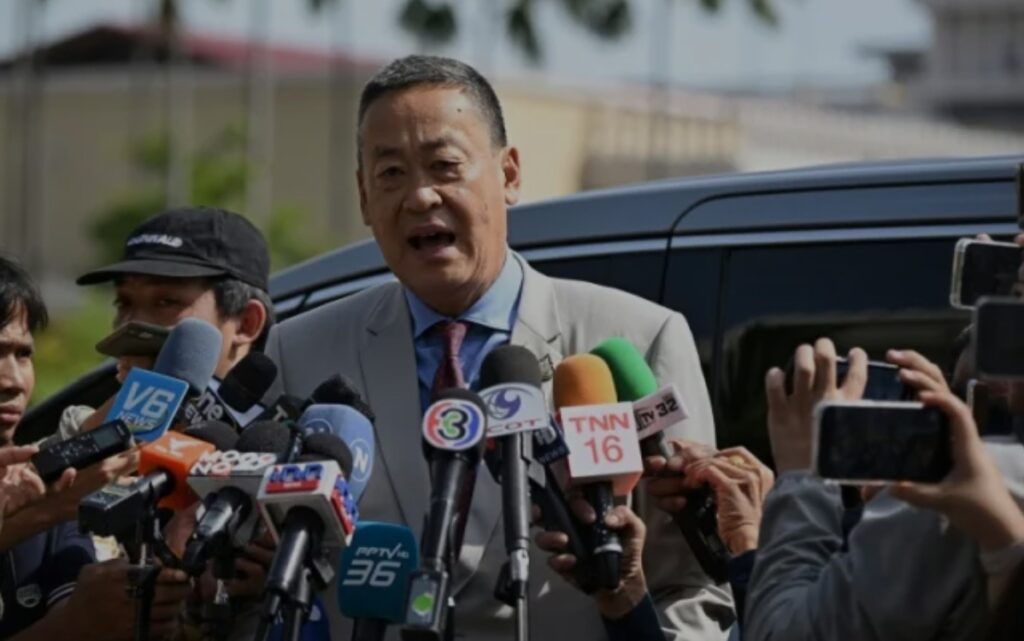The judges ruled 5-4 that Prime Minister Srettha Thavisin breached regulations by appointing a cabinet minister with a criminal conviction

Thailand’s Constitutional Court sacked Prime Minister Srettha Thavisin on Wednesday, branding him dishonest in a ruling in an ethics case that throws the kingdom into fresh political turmoil.
The judges ruled 5-4 that Srettha breached regulations by appointing a cabinet minister with a criminal conviction.
The ruling comes a week after the same court dissolved the main opposition Move Forward Party (MFP) and banned its former leader from politics for 10 years.
Srettha’s appointment showed he “has no honesty and breached ethical standards”, Judge Punya Udchachon said in reading the court’s judgment that “the ministerial position of the prime minister is terminated under the constitution”.
The court ruled that Srettha must have known about lawyer Pichit Chuenban’s 2008 conviction when he appointed him, Punya said.
Srettha leaves office after less than a year in the job — the third prime minister from the Pheu Thai party to be kicked out by the Constitutional Court.
The 62-year-old former property tycoon said he was “sad” to be labelled dishonest, but would abide by the court’s decision.
“I respect the verdict. I reiterate that for the almost one year I have been in this role, I have tried with good intentions to lead the country with honesty,” Srettha told reporters outside his office.
Thai politics has endured two decades of chronic instability, marked by coups, street protests and court orders, much of it energised by the long-running battle between the military, pro-royalist establishment and progressive parties linked to Pheu Thai patriarch Thaksin Shinawatra.
Deputy Prime Minister Phumtham Wechayachai will replace Srettha as a caretaker until parliament meets to vote for a replacement — which could happen as soon as Friday.
Under Thai rules, the new PM must be chosen from the list of candidates parties submitted ahead of the election last year.
As well as Srettha, Pheu Thai party’s nominees included Thaksin’s daughter Paetongtarn Shinawatra.
Writing on the Thai Enquirer news site, political analyst Ken Mathis Lohatepanont said the Pheu Thai-led coalition would “almost certainly hold on”.
He said the PM job was likely “Paetongtarn’s to have if she wants it”, but otherwise it could go to Anutin Charnvirakul, head of the Bhumjaithai party, which is part of the coalition.
– Cycle of turmoil –
Srettha fell over the appointment of Pichit, a lawyer associated with the family of billionaire former prime minister Thaksin — former Manchester City owner and longtime bete noire of the kingdom’s conservative pro-royalist, pro-military elite.
Pichit, sentenced to six months in jail in 2008 for a graft-related offence, quit the cabinet in a bid to save Srettha when the controversy arose earlier this year, but the court pressed ahead with the case.
Srettha came to power less than a year ago at the head of a coalition led by Pheu Thai, after striking a deal with army-linked parties.
The ruling highlights old divisions in Thai politics between the conservative establishment and progressive parties such as Pheu Thai and its new rival MFP.
In the space of a week, the Constitutional Court has dismissed the elected prime minister and dissolved the party that won the most seats at last year’s election — MFP.
Phil Robertson, deputy Asia director at Human Rights Watch, condemned the ruling.
“Thailand’s dark era of destroying democracy through unaccountable rulings of the conservative, elite controlled Constitutional Court continues with the dismissal of PM Srettha Thavisin,” he wrote on social media platform X.
“The absurdity is palpable! Watch foreign investors head for exits.”
Pheu Thai issued a statement vowing to continue to work for the people of the kingdom.
“This is not the first time that Pheu Thai is facing an obstruction. But we will continue working non-stop,” the statement said.
“Every time when we fall, we will move forward and get back with more security, for the better lives of Thai people.”
The case against Srettha was brought by 40 senators who were appointed by the military junta that ousted the elected Pheu Thai government in a 2014 coup.
The senate also played a crucial role in thwarting MFP’s attempt to form a government after it won the most seats in last year’s general election.
Senators alarmed by MFP’s pledges to reform lese-majeste laws and break up powerful business monopolies refused to endorse its then-leader Pita Limjaroenrat as prime minister and the party was forced into opposition.
